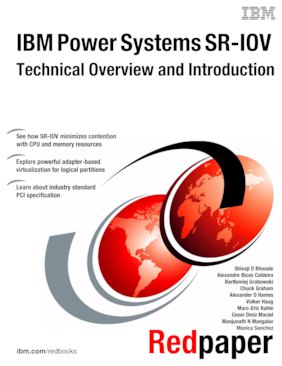
Published on 29 July 2014, updated 12 January 2017
Share this page:
ISBN-10: 073845379X
ISBN-13: 9780738453798
IBM Form #: REDP-5065-00
Authors: Scott Vetter, Shivaji D Bhosale, Alexandre Bicas Caldeira, Bartłomiej Grabowski, Chuck Graham, Alexander D Hames, Volker Haug, Marc-Eric Kahle, Cesar Diniz Maciel, Manjunath N Mangalur and Monica Sanchez
Abstract
This IBM® Redpaper™ publication describes the adapter-based virtualization capabilities that are being deployed in high-end IBM POWER7+™ processor-based servers.
Peripheral Component Interconnect Express (PCIe) single root I/O virtualization (SR-IOV) is a virtualization technology on IBM Power Systems servers. SR-IOV allows multiple logical partitions (LPARs) to share a PCIe adapter with little or no run time involvement of a hypervisor or other virtualization intermediary.
SR-IOV does not replace the existing virtualization capabilities that are offered as part of the IBM PowerVM® offerings. Rather, SR-IOV compliments them with additional capabilities.
This paper describes many aspects of the SR-IOV technology, including:
- A comparison of SR-IOV with standard virtualization technology
- Overall benefits of SR-IOV
- Architectural overview of SR-IOV
- Planning requirements
- SR-IOV deployment models that use standard I/O virtualization
- Configuring the adapter for dedicated or shared modes
- Tips for maintaining and troubleshooting your system
- Scenarios for configuring your system
This paper is directed to clients, IBM Business Partners, and system administrators who are involved with planning, deploying, configuring, and maintaining key virtualization technologies.
Table of Contents
Chapter 1. SR-IOV overview
Chapter 2. Planning
Chapter 3. Deployment scenarios
Chapter 4. Configuration
Chapter 5. Maintenance